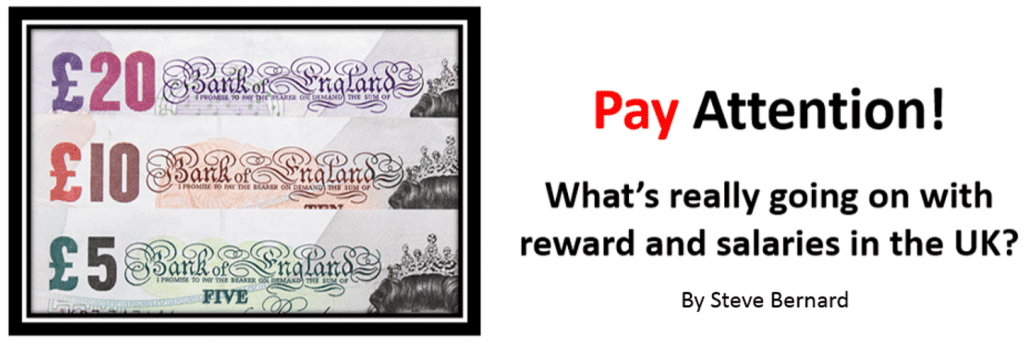PAY Attention! What’s Really Going on with Reward and Salaries in the UK?
In April 2016 the National Minimum Wage will increase, for the over 25s, from £6.50 to £7.20 per hour. Changes to taxation and benefits have created so much noise about pay that it’s hard to know what to think and importantly what’s fair. So, naturally, the question is – what should we really focus our attention on in the pay debate? With the political party election season over, there has been claim after counter claim concerning pay and living standards. It’s time to see beyond the pay data at what’s really important when it comes to rewarding and retaining your talent. The rise in minimum wage of +10% is a very welcome move. The progressive increases planned through to 2020 can only be a good thing for UK workers. With just over 31 million of us in work today the effect will be felt by many. Of that figure, 63% of jobs are full time. Of the remaining proportion it is just 2.4% who are employed on Zero Hours Contracts. Importantly, when asked, 40% of those on these contracts would like more hours in their current jobs. Overall pay in the UK has risen by 2.8% pa in the last measurement period, according to the Office of National Statistics. Executive pay remains strong; at the top level, CEOs of the FTSE 100 earn 130 times the average pay of their employees. Confused? Well don’t be. We believe there are 4 fundamental pillars that are important in this debate:
- Total Reward and Overall Employee Experience
- Pay Equality
- Pay Ratios
- The Quality of Jobs (Enrichment)
Total Reward & Employee Experience
Let’s be clear, pay is important but it is still only one part of the equation. Statistics show time and again that it is not always the most critical factor in people’s minds. A YouGov poll for the Recruitment & Employment Confederation found that “doing something I enjoy” was about as important as salary and benefits. Other considerations include career progression, location, work-life balance, work place culture and relationships with managers and peers. Engagement is increasingly seen by businesses as essential to competitive advantage; to recruit and retain the best talent. Connectwell have always believed the secret to this area was to look beyond pay. While many managers struggle with engagement, we think it’s about designing the right formula more scientifically tailored to your people and business. We, at Connectwell, have created a 6 – point formula, called CEMistry, to support and guide leaders in increasing engagement.
Pay Equality
This is a hot topic right now and rightly so. There is still significant inequality based on gender for example. Helpfully for the debate, more film stars are speaking out on the topic. Recently Sienna Miller actually turned down a Broadway role after finding out she’d be paid 50% less than the male co-lead. There are simply no excuses here. Our workforce should be rewarded based on merit and the quality of the work and productivity, regardless of gender, age or any other difference.
Pay Ratios
We believe another fundamental principle of fairness is the ratio between the highest and the lowest paid individuals within an organisation. In 2011, the Will Hutton report on the topic in the public sector recommended a maximum ratio of 20:1 – in other words the highest paid employee should be paid no more than x20 times the lowest paid. This is why we think the minimum wage rise is important. Today the ratio for the FTSE 100 list of companies stands at 130:1. In the same way Hutton did in 2011, we suggest a word of caution here. There will always be exceptions where the 20:1 may justifiably be breached, but these should be exceptional and easy to understand rationally. It was part of John Spedan Lewis’s (founder of the famous retailer) vision of Industrial Democracy that created the concept of pay ratios, but in recent times even they have increased the ratio from 25:1 to 75:1 We advocate a case by case view, rather than a blanket view, because there are some unusual ‘pay heroes’ that are not always obvious. For example Mark Constantine, founder of Lush; he led the way years ago creating a London Living Wage for his staff because of affordability issues. Also Lord Wolfson of Next recently distributed his personal bonus across his entire workforce. As we say, there are exceptions to the rule but the principle of pay ratios is a valid one in our opinion.
Job Enrichment & Quality
It’s impossible to talk about the minimum wage without also discussing the nature of the work itself. Talk to any decent trade unionist and they will tell you that it’s not just about pay but about the opportunity for gaining fulfilling work. There is a full circle here back to Engagement and the overall employee experience. The rise of large scale outsourcing and zero hour contracts, in and of themselves, are not inherently bad. However if they contribute to unfulfilling work and a poor overall experience, they will then feed through into poor retention at the organisational level and low productivity nationally.
Workplace design has never been so important and with a strengthening economy, more and more decision makers are investing in getting the workplace experience right to drive their talent strategy. Getting the employee experience and engagement right is not alchemy, instead it’s about intelligent design and careful consideration of key business ideas and motivational principles. The ambitious leaders and forward thinking organisations are already on this and are moving towards 20:20 vision in the talent competition. As for the rest, they will be destined to struggle playing catch up for a little while longer.
An article by Steve Bernard
http://www.bbc.co.uk/news/entertainment-arts-34527407








